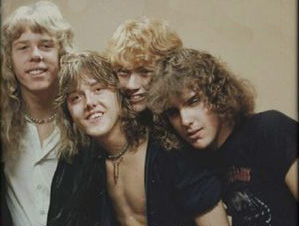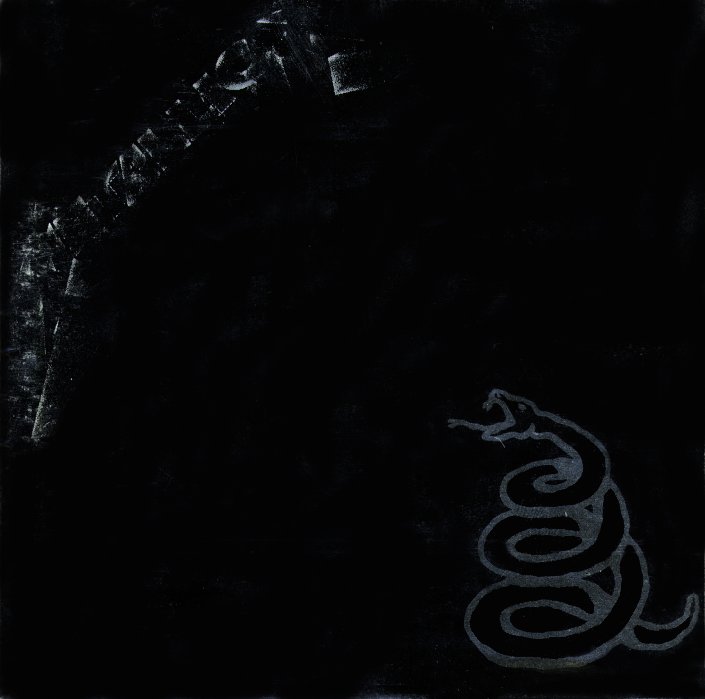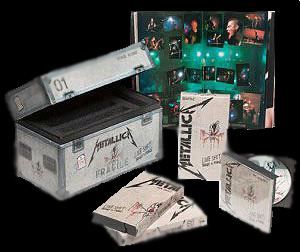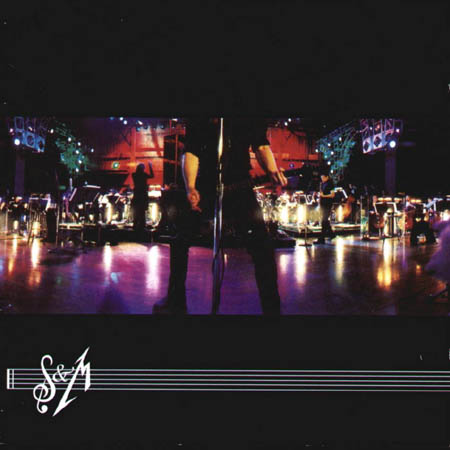METALLICA
M
etallica, The Band, The Myth, The Legend....
 The band began in L.A., October of 1981, When Lars Ulrich made James Hetfiel an offer he couldnt refuse, an offer to join his band who had a secured a deal to record a track for the Metal Blade compilation 'Metal Massacre'. The song 'Hit the Lights' was made for the 'Metal Massacre' slot, written and recorded by James and Lars alone with Lars on the drums and James on guitar, bass, and vocals, and Lloyd Grant covered lead guitar. Lars got the name "Metallica" from a list of Ron Quintara's fanzine names, after convincing Ron to not use "Metallica" he made the suggestion to James and they now had a name, and a track on the compilation. In January of 1982 Dave Mustaine joined the group as lead guitarist, and James roommate Ron Mcgovney took up bass duties. The Original lineup consisted of James Hetfield - Vocals, Lars Ulrich - Drums, Dave Mustaine - Lead Guitar, Ron Mcgovney - Bass.
The band began in L.A., October of 1981, When Lars Ulrich made James Hetfiel an offer he couldnt refuse, an offer to join his band who had a secured a deal to record a track for the Metal Blade compilation 'Metal Massacre'. The song 'Hit the Lights' was made for the 'Metal Massacre' slot, written and recorded by James and Lars alone with Lars on the drums and James on guitar, bass, and vocals, and Lloyd Grant covered lead guitar. Lars got the name "Metallica" from a list of Ron Quintara's fanzine names, after convincing Ron to not use "Metallica" he made the suggestion to James and they now had a name, and a track on the compilation. In January of 1982 Dave Mustaine joined the group as lead guitarist, and James roommate Ron Mcgovney took up bass duties. The Original lineup consisted of James Hetfield - Vocals, Lars Ulrich - Drums, Dave Mustaine - Lead Guitar, Ron Mcgovney - Bass.
The original line up recorded the bands first demo "No Life 'Til Leather" and a buzz in the Metal underground began especially San Francisco and New York. The bands Bassist Ron Mcgovney soon quit the band and was replaced with a great up and coming bassist known as Cliff Burton. Cliff originally in Trauma initially refused the offer to join Metallica, it wasnt until later that he would agree to join only if the other boys would move to San Francisco(Right)

On November 29th, the new line up played their first headliner in the bay area, the band that opened for Metallica, a local band known as Exodus who currently featured Kirk Hammett. The Metallica demo 'No life 'Til Leather' made it into the hands of Jonny Zazula, who contacted the boys to do some gigs at the east-coast. He also tried to get them a contract, but when that failed, he founded his own record label, Megaforce Records.
The band soon began a long journey to New York, The band made it all the way to New York in a stolen U-Haul only to inform their band mate Dave Mustaine that he was being kicked out. Due to excessive drinking and fighting, James, Lars, and Cliff decided Dave was too volatile and needed to be let go. As Dave made his long journey back to San Francisco, One of Metallica's roadies Mark Whitaker suggested a guitar player from a band he knew back in SF, Kirk Hammett joined the band in April of 1983.
The new Lineup played gigs until the end of April but then began immediate work on the bands first album "Kill 'Em All". The new album blew the tired, brain-dead heavy metal genre away. It was a smash hit, songs like "Metal Militia" , "Seek & Destroy" and "Hit The Lights" and "Pulling Teeth" with Cliff's solo became instant classics. After the albums release in July 1983, the official band lineup below began a two month American tour behind the first album. And in Febuary of 1984 the band started its first European tour.

(Burton, Hetfield, Ulrich, and Hammett)
Soon after the release and touring of "Kill 'Em All", the band released "Ride the Lightning" the album was more mature lyrically and musically but kept with the fast paced rythem of the first album it also spent 50 weeks on Billboard's Top 200. In 1985 The band soon signed on to the record label Elektra, most of 85 was spent on tour. The bands third album "Master of Puppets" released in 1986, along with the album the band began a tour with Ozzy Ozbourne. Master of Puppets enjoyed a 72 week run on the US charts and sold over a million copies in the US alone, the album and the tour gained the band more widespread exposure.
The band had a minor setback on the tour with ozzy when James broke his arm will riding a skateboard. Kirk's guitar roadie filled with rhythm guitars while James was healing. After the Ozzy tour the band moved the next leg of touring to Europe, James fulfilled both vocal and rhythm guitar duties on September 26th 1986. This date also marks the last day the band would play with their friend and band mate Cliff Burton.
Early the next morning September 27th, Metallica's tour bus skids off an icy Swedish road whilst the driver sleeps. Popular basist Cliff Burton was killed instantly after that he had been thrown through the wind screen, when he was sort of halfway out of the window the bus fell over him. leaving the band without a bass player, and minus a good friend and mentor Metallica could have called it quits right then. Despite the grief shared by the remaining members they all agreed that Cliff would not have them discontinue a tour as Lars Ulrich was quoted as saying, "Cliff would have been the first one to be pissed off if we didn't." There was no doubt that Metallica would carry on. After auditioning over 40 people Metallica hired their new Bassist Jason Newstead.

Jason coming from former band Floatsam and Jetsam, had the qualities the boys were looking for including his ability to keep up with the bands drinking habits. In 1987 the new foursom jumped in the studio to bang out some Heavy metal cover tunes, the released EP known as "Garage days re-visited" got rave reviews from both fans and critics.
Two years after the bands first top 30 charts topping album "Master of Puppets" Metallica released "...And Justice for All" which blasted immediately into the top 10. This proved every recommendation and rave review given to the band and increased the band overall credibility as the powerhouse it was. Noted song One was even nominated for a Grammy in 1989, Metallica even preformed the song on the show only to have a laughable loss to Jethro Tull.

Metallica had now been living and breathing the music on the "justice" album for more than two years, and they began to realize that they would never be able to make such a complex album again. The songs were all very long and contained quite a few intricate riffs and solos. The band had decided near the end of the "Metal Hammer" tour that they would need a new producer on the next album. The only name that came up was Bob Rock, a producer that included success with The Clut and Mötley Crue. When Bob first met with Metallica he stated that he believed that they were not playing to their full potential and that he thought James could both sing better and differently. Both Bob and Metallica entered the studio in October of 1990, the album finished recording in July of 91, and was sent to be mixed and mastered. After 8 months of studio work and a month of mixing the Album was released on August 12 1991 and debuted at #1 on US charts.
Metallica's self titled album was the next big thing the world was waiting for. It was on almost every chart in the world. The boys started a massive tour binge after the release, the American leg of the tour was supposed to end near April of 92 and the band was to head to Europe, instead the band extended the tour up until July. The band finished the tour in Europe in september of 92 and headed home knowing they were the biggest heavy rock band out. The began 1993 the same way as 92 - tour tour tour. The band even went as far as Maylasia and Thailand this time around. They had also returned to Europe and on June 15, 1993 Megadeth opened for Metallica at the Milton Keynes Concert Bowl in England. There seemed to be no hatred between the band members and all went well. (Suprising since the past with Megadeth front man Dave Mustaine)
In the fall of 1993 Metalica once again broke new ground in the world of heavy rock music, when the box set "Liveshit: Bing & Purge" was released. It was a very massive compilation. It contained:

- A tripple CD with a concert in Mexico City recorded the same year
- Three videos with concerts from San Diego in 1992 (on two tapes) and from Seattle in 1989
- A book with colour pictures from the "Wherever I may Roam" tour.
- A snakepit pass from the same tour.
- James' "Scary guy" drawing, cut out in paper so you can use it to spray the image.
The band was physically and mentally run down after this point and went into remission letting themselves catchup with the lives they had left behind. It would be almost 4 years before the next album would be let loose. The band went back to the studio again with Bob Rock and supposedly produced enough material for 2 albums. Load was released in 1996 and showed another change, the powerful and eclectic sound was one that screamed freedom from the former "black album" era. Soon after "Load" Metallica released "Reload" in 97 which seemed to be the extra material from the load recording session.
Metallica's Load tour was amazing encompassing brand new technology, stuntmen, two stages, and epic two-hours + of performance. Any rumors that the band was down and out were completely blown away. While "Load" and reload never reached the heights of success that "Metallica" did, they were very successful in their own right.
In 1998 Metallica headed back to the studio and produced another 11 cover song album known as "Garage Inc." This album proved that despite the bands overall success its heart still lay in the music and that it wasnt afraid of jamming to old and new tunes again. Metallica's fun and creative side was further proven in 1999 when Michael Kamen, and Metallica collaberated with the San Francisco symphony to bring new dimension to their classic material. Any potential skepticism of the project was blown away by two nights in April at the Berkeley Community Theater which proved to be epic milestones in the group's history. Far from their material being compromised, it gave symphonic instruments the chance to explode into the spaces and fill them with greater, heavier power than ever before. Having recorded and filmed the shows on the off-chance it might turn out alright, Metallica released the S&M double-disc and DVD in late '99, marking yet another significant chapter in the bands great history.

In the summer of 2000, Metallica took yet fresher steps towards establishing freedom from convention, proving that it was possible to assemble, and headline, your own stadium tour without promoting a record. Thus Summer Sanitarium began, It was a huge success, and anticipation grew as to when the band would hit the studio again.
The Napster Fiasco: During the year of 2000, Metallica discovered that a demo of their song "I Disappear" had been floating across the Napster file-sharing network. They soon discovered that their entire catalogue was also freely available. The band immediately determined to sue Napster and in the process asked that 300,000 Napster users "caught" trading Metallica songs be kicked off the network. In 2001 Metallica and Napster agreed to an out-of-court settlement, and the band never actually sued any fans for copyright infringement. Nevertheless, the controversy created a public relations nightmare. In particular, Lars Ulrich found himself portrayed as a greedy and pretentious rock star completely out of touch with his fans.
January 17, 2001 - The news that shocked Metallica, and its fans, Jason leaves Metallica The news and a press release on January 17th confirmed that Jason newstead Metallica's Bass play for the past 14 years was leaving Metallica.
"Due to private and personal reasons, and the physical damage that I have done to myself over the years while playing the music that I love, I must step away from the band. This is the most difficult decision of my life, made in the best interest of my family, myself, and the continued growth of Metallica. I extend my love, thanks, and best wishes to my brothers: James, Lars, and Kirk and the rest of the Metallica family, friends, and fans whom have made these years so unforgettable."
This marked a very low point in recent Metallica history, the band spent early 2001 with a psychologist to help the band figure out who they were, why they were where they were at, and how thingsended up the way they did. During the sessions James decided to head to treatment for alcohol issues. Meanwhile, the shrink continued to meet with Ulrich, guitarist Kirk Hammett and producer Bob Rock. Group therapy intensified when Hetfield got back from rehab, "It was like we were getting to know eachother all over again, or for the first time."